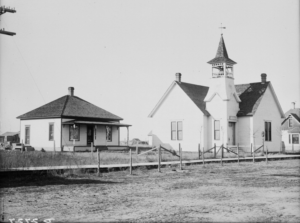The Freedom From Religion Foundation has dropped its latest lawsuit claiming that a law granting a tax benefit to ministers of the gospel is unconstitutional.
The Wisconsin-based non-profit that supports the separation of church and state from a secular perspective allowed a June 14 deadline to pass without appealing a ruling by a federal appeals court in March upholding the clergy housing allowance, a provision that costs the government $700 million a year in lost revenue.

A public domain photo features a church and parsonage in Sumner, Nebraska, in 1910. (Source: Picryl)
“We have full confidence in the legal merits of our challenge of the discriminatory pastoral housing allowance privileges,” said a news release from the charity billed as “the nation’s largest association of freethinkers (atheists, agnostics).”
“We did not feel the same confidence, however, in how the current Supreme Court would rule in our case, had we appealed,” the statement continued.
After “counting heads” on a Supreme Court bench widely viewed as more conservative with the addition of justices Neil Gorsuch and Brett Kavanaugh nominated by President Donald Trump, FFRF leaders said they “concluded that any decision from the current court would put the kibosh on challenging the housing allowance for several generations.”
The Foundation claims the IRS code “preferentially favors the clergy as a special class, while penalizing those of us who are similarly situated in other 501(c)(3) organizations, particularly secular groups such as the Freedom From Religion Foundation that work to emancipate our society from religious dogma.”
A federal law passed in 1954 exempts clergy from paying taxes on portions of their income designated as a ministerial housing allowance. The intent was to put smaller churches unable to afford a parsonage on equal footing with larger and more established congregations already exempt from paying taxes on the rental value of church-owned ministerial housing provided free-of-charge as part of the minster’s salary.
Its passage coincided with the 1950s Red Scare, a period of heated rhetoric during the Cold War rivalry between superpowers the United States and Soviet Union marked by warnings about the perceived threat of Communist infiltration into American society.
“We have full confidence in the legal merits of our challenge of the discriminatory pastoral housing allowance privileges…. We did not feel the same confidence, however, in how the current Supreme Court would rule in our case, had we appealed.”
“Certainly, in these times when we are threatened by a godless and anti-religious world movement, we should correct this discrimination against certain ministers of the gospel who are carrying on such a courageous fight against this foe,” Rep. Peter Mack, an Illinois Democrat who first introduced the legislation, said at the time. “Certainly this is not too much to do for these people who are caring for our spiritual welfare.”
U.S. District Judge Barbara Crabb has twice ruled that giving a tax break not available to others to “ministers of the gospel” violates the First Amendment’s ban on the establishment of religion.
Both times she was overruled by the Chicago-based 7th U.S. Circuit Court of Appeals. The appellate court said in 2014 that the Freedom From Religion Foundation lacked legal standing to sue. In March of this year the court of appeals ruled that the parsonage allowance “falls into the play between the joints of the Free Exercise Clause and the Establishment Clause: neither commanded by the former, nor proscribed by the latter.”
Becket –a non-profit, public interest legal and educational institution that represented a group of ministers desiring that the tax break be upheld — said the government makes similar accommodation “for soldiers, diplomats, peace corps workers, prison wardens, non-profit presidents, oil executives, school superintendents, teachers, nurses, fisherman, and many more” under a legal doctrine known as “convenience of the employer.”
“The court rightly recognized that providing this kind of equal treatment to churches is perfectly constitutional, and churches should be allowed to serve the neediest members of their communities without the tax man breathing down their neck,” said Luke Goodrich, vice president and senior counsel of the group formerly known as the Becket Fund for Religious Liberty.
The Alliance Defending Freedom, a legal advocacy group founded by leaders of the Christian Right to counter work of the American Civil Liberties Union, filed a friend-of-the-court brief in the case last year on behalf of 8,899 churches and pastors who said they rely on the housing allowance exemption to help them pay their bills.
Annie Laurie Gaylor, co-president of the Freedom From Religion Foundation, has called the ministerial housing allowance “a handout to churches and clergy” that “clearly shows preferential treatment and discriminating in favor of ministers.”
Previous stories:
Appellate court says tax break for clergy housing is constitutional
For second time, federal judge strikes down tax break for clergy
Group files new challenge to clergy tax break
